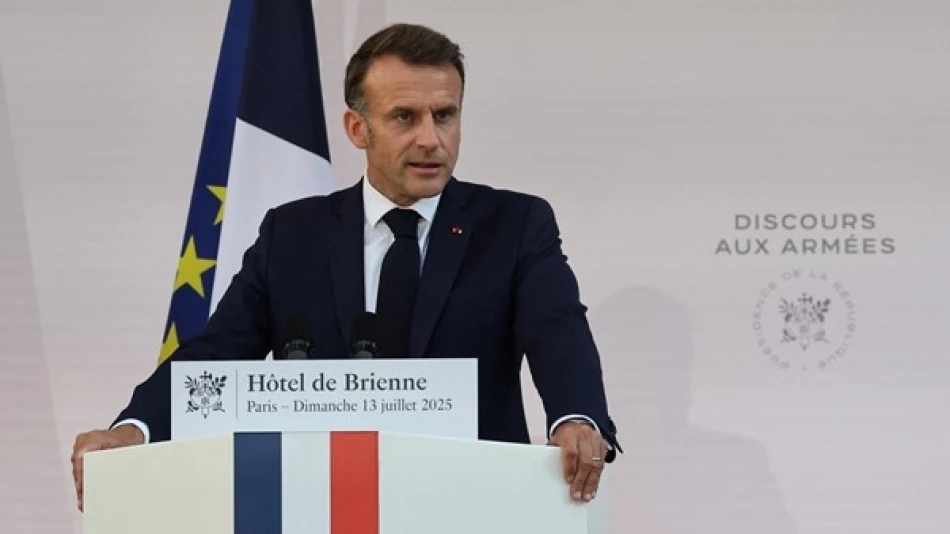
French President Macron Backs Vote of Confidence in Government
France Faces Political Brinkmanship as Macron Backs Risky Confidence Vote on Austerity
President Emmanuel Macron has thrown his full support behind Prime Minister François Bayrou's decision to call a confidence vote, risking another government collapse as France grapples with mounting debt that now stands at 114% of GDP. The high-stakes political gamble could either secure parliamentary backing for €44 billion in deficit cuts or plunge the eurozone's second-largest economy into deeper institutional crisis.
A Calculated Risk in Fragmented Parliament
Bayrou's confidence vote represents a bold attempt to break France's political deadlock, but the arithmetic looks challenging. Both left-wing opposition parties and Marine Le Pen's far-right National Rally have already signaled they will vote against the government. Even more troubling for Macron's camp, parliamentary sources suggest that not all 50 members of the center-right Republican Party—ostensibly part of the governing coalition—are guaranteed to support the measure.
This parliamentary fragmentation reflects the broader political realignment that has gripped France since Macron's centrist movement lost its absolute majority. Unlike the stable coalitions seen in Germany or the Netherlands, France's political system struggles to accommodate minority governments, making every major policy decision a potential existential threat.
The Debt Crisis Behind the Drama
France's debt-to-GDP ratio of 114% places it among Europe's most indebted nations, trailing only Italy and Greece in the eurozone. This figure has steadily climbed from around 100% before the COVID-19 pandemic, driven by massive stimulus spending and structural deficits that predate the health crisis.
Bayrou's €44 billion deficit reduction plan represents approximately 1.7% of France's GDP—a substantial fiscal adjustment by European standards. The package likely includes spending cuts across government departments and potential tax increases, though specific details remain closely guarded as the government seeks to maintain coalition unity.
Market Implications and Investor Concerns
Financial markets have grown increasingly nervous about France's fiscal trajectory. The country's borrowing costs have risen relative to German bonds, and rating agencies have warned about potential downgrades if deficit reduction stalls. A government collapse would likely trigger fresh market volatility and could force France's next administration to implement even harsher austerity measures under market pressure.
The situation mirrors challenges faced by other European governments attempting fiscal consolidation in fragmented political landscapes. Italy's frequent government changes have historically complicated its debt management, while Spain and Portugal successfully implemented austerity programs only with strong parliamentary majorities or external pressure from EU institutions.
Opposition Strategy: Chaos or Responsibility?
Bayrou's appeal for opposition parties to choose between "chaos" and "responsibility" reflects the government's hope that political pragmatism will override partisan calculations. However, both left and far-right opposition parties appear to view government collapse as politically advantageous, betting that public frustration with economic conditions will benefit them in any subsequent election.
This dynamic has become familiar across European democracies where traditional center-left and center-right parties have lost ground to more radical alternatives. The confidence vote essentially tests whether France's political system can still produce the compromises necessary for effective governance in an era of fragmented parliaments.
Macron's Diminished Authority
The president's "full support" for Bayrou carries less weight than it would have earlier in his presidency. With approval ratings hovering around historical lows and limited ability to call new parliamentary elections until later this year, Macron finds himself increasingly dependent on parliamentary arithmetic beyond his direct control.
If the confidence vote fails, France could face its second government collapse within months, further undermining the country's reputation for political stability and potentially accelerating the timeline for Macron's eventual departure from politics. Success, meanwhile, would provide crucial breathing room but would not resolve the underlying tensions that have made France increasingly difficult to govern.
Most Viewed News

 Layla Al Mansoori
Layla Al Mansoori






